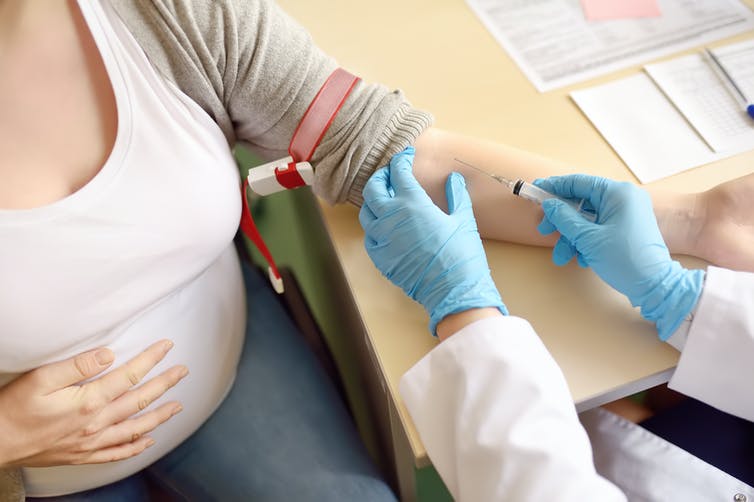
Some say we are culturally obsessed with managing risk. You might disagree, but once you become pregnant, and especially as a first time parent-to-be, it can sure feel that way.
Unfortunately, most people struggle with assessing risk accurately. These challenges stem from the quality of information that circulates, but also from biases that hinder sound thinking. In addition, not everyone agrees on pregnancy-related risks, and much has been written about the over-medicalization of pregnancy that may generate excessive worry and unnecessary testing.
In a growing numbers of pregnancies, people have been making use of an emerging technology called non-invasive prenatal testing (NIPT) — or NIPS (S for screening) — which analyzes tiny fragments of DNA from the placenta that circulate in maternal blood to assess the chance that the fetus has certain genetic conditions. The test is non-invasive to the fetus, but does involve taking a sample of the mother’s blood.
As researchers examining public perceptions and ethics, our latest research shows just how complex it can be for the public to use this test.
NIPT can be performed as early as nine weeks into the pregnancy. It can assess risk for genetic anomalies such as trisomies 13, 18 and 21, which cause Patau, Edwards and Down syndromes, respectively, with relatively high reliability. While it has the potential, albeit rarely, to return false positive or false negative results, it poses no increased risk of miscarriage like diagnostic invasive tests, such as amniocentesis.

(Shutterstock)
It’s a powerful tool, but also one that comes with controversy, especially when used to detect rarer conditions and when marketed by companies inflating its potential as a screening tool.
NIPT use is increasing around the world. Some countries now offer it, free of charge, to all pregnant persons. Other countries do so for those deemed “high risk” — a sometimes complicated determination.
Canadian decision-makers are now asking whether NIPT should be publicly funded and offered to all pregnant persons. This decision comes with challenges. There are issues related to cost, and patient and practitioner education, but also of increased medicalization of pregnancy. Public funding could also have negative consequences for disability rights, like increasing the stigma associated with disability and the discrimination against people living with disabilities.
Perceptions of risk
Our recent study found rich NIPT discussions taking place on the social media platform Reddit. Comments from Redditors (Reddit users) were mostly in favour of increased access to NIPT, despite expressing some concerns about the test’s accuracy. Redditors were eager to share their perspectives, knowledge and experiences.
Interestingly, one-third of the discussions touched on interpreting perceptions of risk. NIPT results indicate either low or high risk, with results often expressed as a ratio or percentage. Redditors were trying to make sense of acceptable risk in pregnancy, and whether others shared similar feelings.

(Shutterstock)
Notably, there was no discernable consensus around what results constitute high or low risk. What was low for some was high for others. And even the way results were presented (for example, percentages versus ratios) changed how they felt about them.
One person, for example, reported an NIPT result of 1:22, to which another responded, “Maybe it will help you to think in percentages; there is ‘only’ a 4.55 per cent risk. A lot higher than normal, but somehow the risk seems lower this way.” The initial poster responded, “Thanks! That’s a much better number to focus on.”
For Redditors confused about the strength or reliability of the numbers, there was much to discuss. Some focused on the test’s ability to screen (determine probability) but not diagnose (confirm with certainty), and many raised highly technical statistical considerations about statistical expressions of risk like “sensitivity versus specificity” and “positive predictive values.”
Others expressed concerns and confusion regarding what classified some pregnancies as “high risk” and why such classification differs across health-care systems.
Some were dismayed, even appalled, at how medical professionals disclosed results. They sensed that health-care workers assumed that patients with a positive result indicating a high-risk pregnancy would want additional testing, or would be planning for termination.
For some Redditors who received a positive result of a high-risk pregnancy, the possibility of a false positive became something to lean on. Stories were shared. “I’ve done a lot of reading and false positives are super common,” wrote one Redditor, which is inaccurate for trisomies 13, 18 and 21, but can be true regarding rarer conditions like DiGeorge Syndrome.
Online anecdotes and interpretations
The Reddit community adds another level of risk subjectivity, by offering anecdotes and interpretations that may not be grounded in statistical evidence. A powerful story can have huge sway.
One highly detailed false-negative anecdote rippled through discussions, to which another Redditor bluntly replied, “The chance of a false negative is very very low,”, which, again, is an accurate statement when testing for trisomies 13, 18 and 21.

(Shutterstock)
As the general public struggles with interpreting NIPT results and determining what should be considered serious, the situation is similar for health professionals and policy experts. Policies governing genomic technologies are partly determined by the threshold of what is considered a serious condition. Yet “serious” is incredibly difficult to define and interpret in different contexts.
Importantly, the value and meaning given to NIPT emerges collectively. As observed in Denmark, widespread access to prenatal genetic testing can blur lines between public and private choices, inflaming debates around core social values.
What should be done with an emerging technology like NIPT, that many want and that many will use? Individuals may approach the test with different expectations, perspectives, knowledge or preferences. Research shows not everyone will use or reject NIPT for similar reasons.
Health-care systems will need to think about how NIPT can be delivered for diverse populations in a way that incorporates individual perspectives. As our study shows, social media plays a role in shaping these perspectives. It’s important to think about how best to use complex online spaces to communicate accurate and accessible information that supports people in making decisions.
![]()
Alessandro Marcon works at the University of Alberta's Health Law Institute, which has received funding related to this project from Genome Canada, Genome Alberta, and CIHR.
Vardit Ravitsky receives funding from Genome Canada, CIHR, FRQ.
























